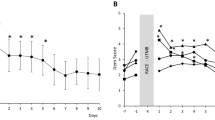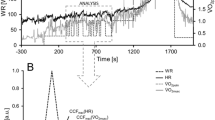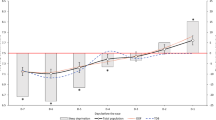Abstract
The aim of this study was to observe how the combined effects of time-of-day and sleep deprivation impact motocross riders’ physical abilities. Balance, flexibility and maximal anaerobic alactic power were tested across laboratory tests that required only one ability (stork stand test, sit-and-reach test, Abalakov test) or across field tests that concentrated on a particular ability (narrow board riding test, riding under a rod test, long jump riding test) to maximise the sensitivity of the assessments and the interpretability of findings. Eight motocross riders of confirmed level took part in test sessions set up at 0600 and 1800 hours following a normal night’s sleep and a night of sleep deprivation, i.e. after 1, 13, 23 and 35 waking hours. On the one hand, the results confirmed the influence of time-of-day on riders’ physical abilities, performances being better at 1800 hours than at 0600 hours after the normal night’s sleep. On the other hand, as far as sleep deprivation effects are concerned, the results seemed to differ on the basis of the ability under consideration and the type of test that had been set up. Performance in the field tests still presented a diurnal fluctuation, whereas this improvement over the day did not occur for the performance in the laboratory tests. It seems that compensation mechanisms between the various abilities brought into play are set up in order to moderate the effects of the lack of sleep when riding.





Similar content being viewed by others
References
Achermann P (2004) The two-process model of sleep regulation revisited. Aviat Space Environ Med 75:A37–A43
Adams MA, Dolan P, Hutton WC (1987) Diurnal variations in the stresses on the lumbar spine. Spine 12:130–137
Atkinson G, Reilly T (1996) Circadian variation in sports performance. Sports Med 21:292–312
Avni N, Avni I, Barenboim E, Azaria B, Zadok D, Kohen-Raz R, Morad Y (2006) Brief posturographic test as an indicator of fatigue. Psychiatry Clin Neurosci 60:340–346
Ax AF, Fordyce W, Loovas I, Meredith W, Pirojnikoff L, Shmavonia B, Wendahl R (1967) Quantitative effects of sleep deprivation. US Army Quartermaster Res Dev Res Rep
Banks S, Dinges DF (2007) Behavioral and physiological consequences of sleep restriction. J Clin Sleep Med 3:519–528
Banks JH, Sternberg JJ, Farrell JP, Debow CH, Dalhamer WA (1970) Effects of continuous military operations on selected military tasks. Behavior and systems research laboratory, office of research and development, department of the army. Tech Res Rep 1166
Borbely AA (2009) Refining sleep homeostasis in the two-process model. J Sleep Res 18:1–2
Borbely AA, Achermann P (1999) Sleep homeostasis and models of sleep regulation. J Biol Rhythms 14:557–568
Bougard C, Moussay S, Davenne D (2006) Effets combinés de l’heure de la journée et de la privation de sommeil sur les performances de pilotage d’un deux roues. Recherche Transports Sécurité 91:137–151
Bougard C, Moussay S, Davenne D (2008) An assessment of the relevance of laboratory and motorcycling tests for investigating time of day and sleep deprivation influences on motorcycling performance. Accid Anal Prev 40:635–643
Bougard C, Bessot N, Moussay S, Sesboüé B, Gauthier A (2009) Effects of waking time and breakfast intake prior to evaluation of physical performance in the early morning. Chronobiol Int 26:307–323
Bougard C, Lepelley MC, Davenne D (2010) The influences of time-of-day and sleep deprivation on postural control. Exp Brain Res. doi:10.1007/s00221-010-2524-8
Brown ID (1994) Driver fatigue. Hum Factors 36:298–314
Caldwell J (1995) Assessing the impact of stressors on performance: observations on levels of analyses. Biol Psychol 40:197–208
Campbell J (2001) Ten things not to do in the Paris-Dakar rally. Dirt bike 31:76–77
Chee MW, Tan JC, Zheng H, Parimal S, Weissman DH, Zagorodnov V, Dinges DF (2008) Lapsing during sleep deprivation is associated with distributed changes in brain activation. J Neurosci 28:5519–5528
Dahms P, Schaad G, Gorges W, von Restorff W (1996) Psychological results of mental performance in sleep deprivation. Wien Med Wochenschr 146:287–289
De Waard D (1996) The measurement of drivers’ mental workload. The Traffic Research Center VSC, University of Groningen
De Waard D, Brookhuis KA (1997) On the measurement of driver mental workload. In: Rothengatter JA, Carbonell-Vaya E (eds) Traffic and transport psychology theory and application. Pergamon, Oxford, pp 161–171
Drummond SP, Brown GG, Salamat JS, Gillin JC (2004) Increasing task difficulty facilitates the cerebral compensatory response to total sleep deprivation. Sleep 27:445–451
Drummond SP, Meloy MJ, Yanagi MA, Orff HJ, Brown GG (2005) Compensatory recruitment after sleep deprivation and the relationship with performance. Psychiatry Res 140:211–223
Drust B, Waterhouse J, Atkinson G, Edwards B, Reilly T (2005) Circadian rhythms in sports performance-an update. Chronobiol Int 22:21–44
Durmer JS, Dinges DF (2005) Neurocognitive consequences of sleep deprivation. Semin Neurol 25:117–129
Engel JD (1970) An approach to standardizing human performance assessment. In: Planning conference of standardization of tasks and measures for human factors research. Lubbock, Texas
Fabbri M, Martoni M, Esposito MJ, Brighetti G, Natale V (2006) Postural control after a night without sleep. Neuropsychologia 44:2520–2525
George CF (2004) Sleep. 5: driving and automobile crashes in patients with obstructive sleep apnoea/hypopnoea syndrome. Thorax 59:804–807
Gifford LS (1987) Circadian variation in human flexibility and grip strength. Aust J Physiotherapy 33:3–9
Glaser R, Klaus DJ (1962) Proficiency measurement: assessing human performance. In: Gagne RM (ed) Psychological principles in system development. Holt, Rinehart and Wiston, New York, pp 419–474
Gobbi AW, Francisco RA, Tuy B, Kvitne RS (2005) Physiological characteristics of top level off-road motorcyclists. Br J Sports Med 39:927–931
Hacking L, De Clercq W (2008) To Dakar and back: 21 days across North Africa by motorcycle. Ecw, Toronto
Haggard DF (1970) HumRRO studies in continuous operations. HumRRO Professional Paper 7–70 AD 705–705
Haworth N, Rowden P (2006) Fatigue in motorcycle crashes. Is there an issue? In: Proceedings Australasian road safety research, policing and education conference, Gold Coast, Queensland
Johnson LC, Naitoh P (1974) The operational consequences of sleep deprivation and sleep deficit. NATO/AGARDograph No. 193. http://www.dtic.mil/cgi-bin/GetTRDoc?AD=AD783199. Accessed 13 October 2010
Kar S, Routray A, Nayak BP (2010) Functional network changes associated with sleep deprivation and fatigue during simulated driving: validation using blood biomarkers. Clin Neurophysiol. doi:10.1016/j.clinph.2010.08.009
Klarica AJ (2001) Performance in motor sports. Br J Sports Med 35:290–291
Konttinen T, Kyrolainen H, Hakkinen K (2008) Cardiorespiratory and neuromuscular responses to motocross riding. J Strength Cond Res 22:202–209
Léger D, Elbaz M, Raffray T, Metlaine A, Bayon V, Duforez F (2008) Sleep management and the performance of eight sailors in the Tour de France à la voile yacht race. J Sports Sci 26:21–28
Liu YC, Wu TJ (2009) Fatigued driver’s driving behavior and cognitive task performance: Effects of road environments and road environment changes. Saf Sci 47:1083–1089
Markovic G, Dizdar D, Jukic I, Cardinale M (2004) Reliability and factorial validity of squat and countermovement jump tests. J Strength Cond Res 18:551–555
Matthews G, Desmond PA (2002) Task-induced fatigue states and simulated driving performance. Q J Exp Psychol A 55:659–686
McLellan TM, Kamimori GH, Bell DG, Smith IF, Johnson D, Belenky G (2005) Caffeine maintains vigilance and marksmanship in simulated urban operations with sleep deprivation. Aviat Space Environ Med 76:39–45
Meney I, Waterhouse J, Atkinson G, Reilly T, Davenne D (1998) The effect of one night’s sleep deprivation on temperature, mood, and physical performance in subjects with different amounts of habitual physical activity. Chronobiol Int 15:349–363
Mikulincer M, Babkoff H, Caspy T, Sing H (1989) The effects of 72 hours of sleep loss on psychological variables. Br J Psychol 80:145–162
Millar K (1992) Some chronic problems in the methodology of performance task applied in clinical settings. In: Ogilvie R, Broughton R (eds) Sleep, arousal and performance. Birkhauser, Boston, pp 31–53
Miller DK (2002) Measurement by the physical educator: why and How, 2nd edn. Brown and Benchmark, Madison
Morad Y, Azaria B, Avni I, Barkana Y, Zadok D, Kohen-Raz R, Barenboim E (2007) Posturography as an indicator of fatigue due to sleep deprivation. Aviat Space Environ Med 78:859–863
Na SH, Jin SH, Kim SY (2006) The effects of total sleep deprivation on brain functional organization: mutual information analysis of waking human EEG. Int J Psychophysiol 62:238–242
Nakano T, Araki K, Michimori A, Inbe H, Hagiwara H, Koyama E (2001) Nineteen-hour variation of postural sway, alertness and rectal temperature during sleep deprivation. Psychiatry Clin Neurosci 55:277–278
Pilcher JJ, Huffcutt AI (1996) Effects of sleep deprivation on performance: a meta-analysis. Sleep 19:318–326
Pilcher JJ, Band D, Odle-Dusseau HN, Muth ER (2007) Human performance under sustained operations and acute sleep deprivation conditions: toward a model of controlled attention. Aviat Space Environ Med 78:15–24
Racinais S, Hue O, Hertogh C, Damiani M, Blonc S (2004) Time-of-day effects in maximal anaerobic leg exercise in tropical environment: a first approach. Int J Sports Med 25:186–190
Reilly T (1990) Human circadian rhythms and exercise. Crit Rev Biomed Eng 18:165–180
Reilly T, Bambaeichi E (2003) Methodological issues in studies of rhythms in human performance. Biol Rhythm Res 34:321–336
Reilly T, Atkinson G, Waterhouse J (1997) Travel fatigue and jet-lag. J Sports Sci 15:365–369
Reilly T, Atkinson G, Edwards B, Waterhouse J, Farrelly K, Fairhurst E (2007) Diurnal variation in temperature, mental and physical performance, and tasks specifically related to football (soccer). Chronobiol Int 24:507–519
Sagaspe P, Taillard J, Akerstedt T, Bayon V, Espie S, Chaumet G, Bioulac B, Philip P (2008) Extended driving impairs nocturnal driving performances. PLoS One 3:e3493
Schlesinger A, Redfern MS, Dahl RE, Jennings JR (1998) Postural control, attention and sleep deprivation. Neuroreport 9:49–52
Souissi N, Davenne D (2004) Rythmicité circadienne et performances anaérobies. Science et Motricité 53:39–55
Souissi N, Sesboüé B, Gauthier A, Larue J, Davenne D (2003) Effects of one night’s sleep deprivation on anaerobic performance the following day. Eur J Appl Physiol 89:359–366
Souissi N, Bessot N, Chamari K, Gauthier A, Sesboüé B, Davenne D (2007) Effect of time of day on aerobic contribution to the 30-s Wingate test performance. Chronobiol Int 24:739–748
Tassi P, Muzet A (2000) Sleep inertia. Sleep Med Rev 4:341–353
Thomas M, Sing H, Belenky G, Holcomb H, Mayberg H, Dannals R, Wagner HN, Thorne D, Popp K, Rowland L, Welsh A, Balwinski S, Redmond D (2003) Neural basis of alertness and cognitive performance impairments during sleepiness. II. Effects of 48 and 72 h of sleep deprivation on waking human regional brain activity. Thalamus Relat Syst 2:199–229
Tomida Y, Hirata H, Fukuda A, Tsujii A, Kato K, Fujisawa K, Uchida A (2005) Injuries in elite motorcycle racing in Japan. Br J Sports Med 39:508–511
Uimonen S, Laitakari K, Bloigu R, Sorri M (1994) The repeatability of posturographic measurements and the effects of sleep deprivation. J Vestib Res 4:29–36
Wells KF, Dillon EK (1952) The sit and reach: a test of back and leg flexibility. Res Q 23:115–118
Acknowledgments
We would like to thank the subjects for their availability for taking part in this study. This work was supported in part by a PREDIT-GO4 contract. Clément Bougard was awarded a grant for his PhD thesis by the Conseil Régional de Basse-Normandie (Regional Council of Lower Normandy) and the Institut national de recherche sur les transports et leur sécurité (The French National Institute for Transport and Safety Research). None of the authors had a conflict of interest or financial disclosure related to this work.
Author information
Authors and Affiliations
Corresponding author
Additional information
Communicated by Susan A. Ward.
Rights and permissions
About this article
Cite this article
Bougard, C., Davenne, D. Effects of sleep deprivation and time-of-day on selected physical abilities in off-road motorcycle riders. Eur J Appl Physiol 112, 59–67 (2012). https://doi.org/10.1007/s00421-011-1948-6
Received:
Accepted:
Published:
Issue Date:
DOI: https://doi.org/10.1007/s00421-011-1948-6




